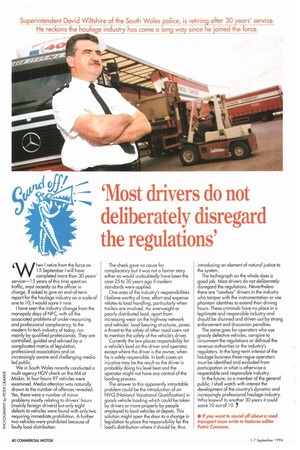'Most drivers do not deliberately disregard the regulations'
Page 42

If you've noticed an error in this article please click here to report it so we can fix it.
hen I retire from the force on 15 September I will have completed more than 30 years' service-15 years of this time spent on traffic, most recently as the officer in charge. If asked to give an end-of-term report for the haulage industry on a scale of one to 10, I would score it nine.
I have seen the industry change from the monopoly days of NEC, with all the associated problems of under-resourcing and professional complacency, to the modern hi-tech industry of today, run mainly by qualified professionals. They are controlled, guided and advised by a complicated matrix of legislation, professional associations and an increasingly aware and challenging medialed public. We in South Wales recently conducted a multi-agency HGV check on the M4 at Miskin. In four hours 97 vehicles were examined. Media attention was naturally drawn to the number of offences revealed. Yes, there were a number of minor problems mostly relating to drivers` hours (mainly foreign drivers) but only eight defects to vehicles were Found with only two requiring immediate prohibition. A further Iwo vehicles were prohibited because of faulty load distribution. The check gave no cause for complacency but it was not a horror story either as would undoubtedly have been the case 25 to 30 years ago if modern standards were applied. One area of the industry's responsibilities I believe worthy of time, effort and expense relates to load handling, particularly when trailers are involved. An overweight or poorly distributed load, apart from increasing wear on the highway network and vehicles' load-bearing structures, poses a threat to the safety of other road users not to mention the safety of the vehicle's driver. Currently the law places responsibility for a vehicle's load on the driver and operator, except where the driver is the owner, when he is solely responsible. In both cases an injustice may be the result as the driver is probably doing his level best and the operator might not have any control of the loading process. The answer to this apparently intractable problem could be the introduction of an NVQ (National Vocational Qualification) in goods vehicle loading which could be taken by drivers or more properly by people employed to load vehicles at depots. This solution might open the door to a change in legislation to place the responsibility for the load's distribution where it should lie, thus introducing an element of natural justice to the system.
The tachograph on the whole does a good job. Most drivers do not deliberately disregard the regulations. Nevertheless there are "cowboy" drivers in the industry who tamper with the instrumentation or use phantom identities to extend their driving hours. These criminals have no place in a legitimate and responsible industry and should be shunned and driven out by strong enforcement and draconian penalties.
The some goes for operators who use grossly defective vehicles, conspire to circumvent the regulations or defraud the revenue authorities or the industry's regulators. In the long-term interest of the haulage business these rogue operators must be identified and excludec from participation in what is otherwise a respectable and responsible industry. In the future, as a member of the general public, I shall watch with interest the development of the country's dynamic and increasingly professional haulage industry. Who knows? In another 30 years it could score 10 out of 10.
























































































































